|
Limitar tu búsqueda
[+–] Compilador o editor
[+–] Editorial
[+–] Fecha
[+–] Formato
[+–] Idioma
[+–] Tipo de documento
[+–] Tipo de recurso
|

|
|
Different worlds, common roots a multilevel analysis of youth violence and delinquency in the netherlands antilles as a basis for crime prevention
Most research on the prevalence, determinants, and variations of violence and delinquency among youngsters is conducted in Western societies. This multilevel study is set in the Netherlands Antilles (NA) and aims to build up prognostic multilevel models as a basis for targeted crime prevention in a non-western area. Data were collected from a sample of adolescente in the NA. Non-hierarchical and...
|
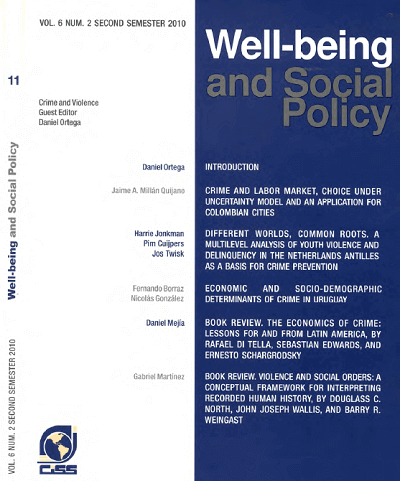
|
|
|
|

|
|
Book review. The economics of crime: lessons for and from Latina America, by Rafael Di Tella, Sebastian Edwards, and Ernesto Schargrodsky
The Economics of Crime: Lessons for and from Latin America makes an important contribution to the study of crime and violence in Latin America and to the debate about what works for reducing crime (and at what cost?). As the title of the book correctly suggests, the book brings together contributions from Latin American economists on the determinants and consequences of crime, as well as...
|
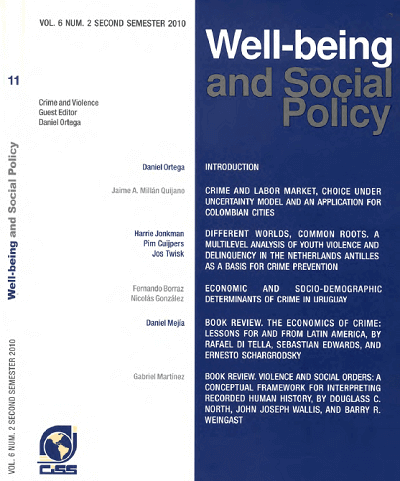
|
|
|
|

|
|
Book review. Violence and social orders: a conceptual framework for interpreting recorded human history, by Douglas C. North, John Joseph Wallis, and Barry R. Weingast
Why societies differ in their level of violence? This is the question addressed by North, Wallis, and Weingast. To provide an answer they must develop a rich theory of how individuals and organizations that compose a human group voluntarily surrender their will to act violently in exchange for participating in a society with improved conditions for the creation and conservation of wealth.
|
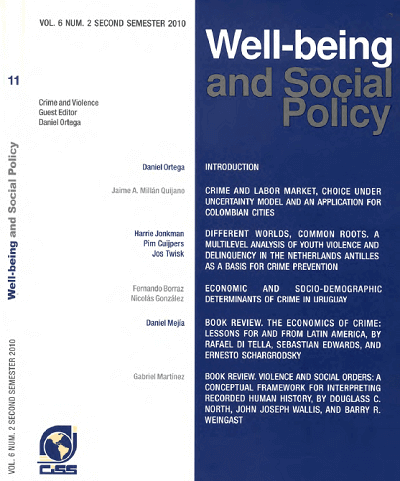
|
|
|
|

|
|
Are loan guarantees effective? The case of mexican government banks
Mexican Government’s Banks offer loan guarantees to private banks in order to spur credit directed to non-financial small and medium sized firms and this policy is examined here. Application of representative data to the comparative static analysis of the guarantee-use decision suggests that these schemes, as currently designed, are justifiable from an economic viewpoint. However, there is some...
|
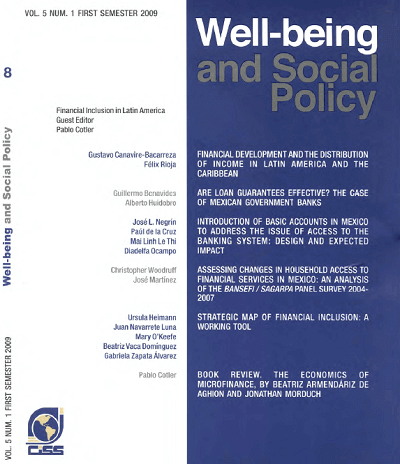
|
|
|
|

|
|
Financial development and the distribution of income in Latina America and the Caribbean
One of the central concerns in Latin America an the Caribbean (LAC) has been the reduction of poverty and inequality so prevalent in the continent. Using large world samples, the literature has found that financial development increases economic growth, increases the income of the poor, and reduces inequality. This paper studies the effects of financial development on the whole distribution of...
|
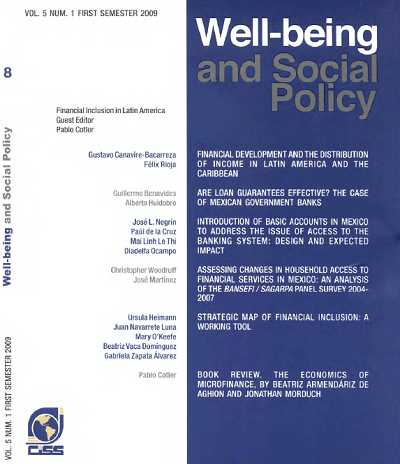
|
|
|
|

|
|
Feasibility analysis of an integrated health system: financial and distributive implications
The document presents spending projections and projections of the distributive incidence for an Integrated Health System under three basic scenarios: status quo, a two pillar scheme (financed through general taxes and private spending) and a three pillar scheme (financed through general taxes, social security contributions and private spending). By presenting these simulations, the study enhances...
|
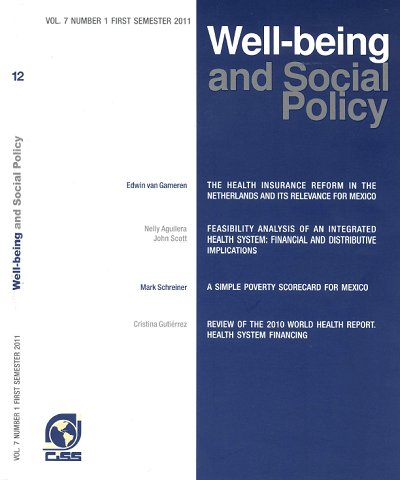
|
|
|
|

|
|
The health insurance reform in the Netherlands and its relevance for Mexico
Alrededor del mundo se observan dos versiones de la organización de los seguros de salud; la seguridad social basada en el empleo, y los servicios nacionales de salud. En Latinoamérica regularmente se usa la primera, pero se está lejos de lograr la cobertura universal. En los Países Bajos encontramos una peculiar mezcla de obligaciones públicas y responsabilidades privadas. La cobertura universal...
|
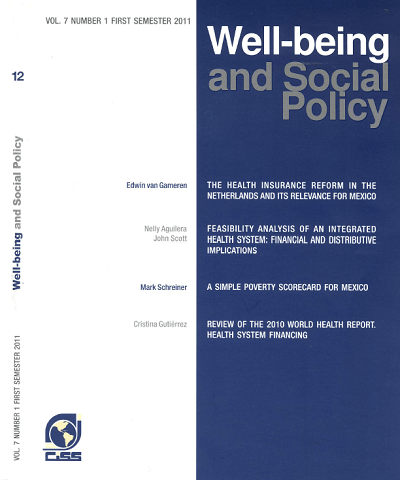
|
|
|
|

|
|
Hurricane Mitch and consumption growth of nicaraguan agricultural households
There is little micro-evidence on the persistence of natural disasters' welfare impacts. This paper assesses the effect of Hurricane Mitch on consumption of Nicaraguan agricultura) households. Mitch occurred in October 1998. Pre-post data is obtained from a nationally representative panel collected in 1998 and 2001. An additional survey was fielded in 1999 for households from the panel affected...
|
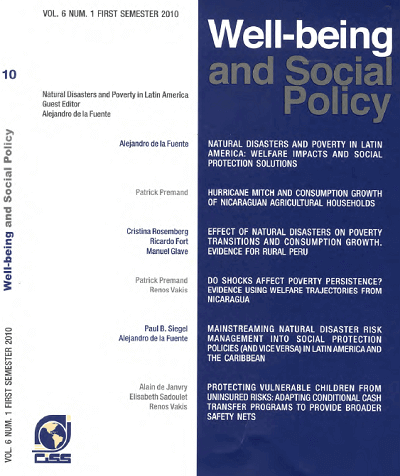
|
|
|
|

|
|
Book review. The economics of microfinance, by Beatriz Armendáriz de Aghion and Jonathan Morduch
The book by Armendáriz and Morduch focuses on how microfinance institutions work, what has been their impact and whether they are financially sustainable. For such purpose the book can be divided—from my viewpoint—into six sections. The first describes the environment of imperfect information that surrounds credit transactions and the consequences that this entails. First the authors define in a...
|
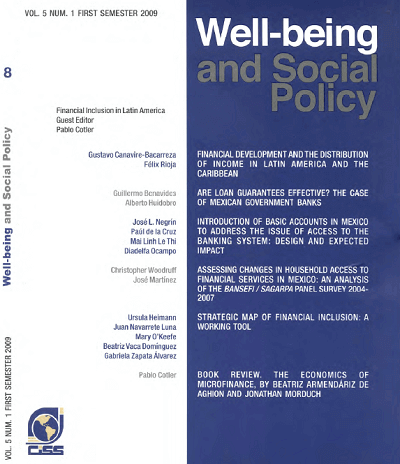
|
|
|
|

|
|
Mainstreaming natural disaster risk management into social protection policies (and vice versa) in Latina America and the Caribbean
This paper presents and applies the social risk management (SRM) conceptual framework to examine links between disaster risk, hazards, vulnerability, risk management, and social protection (SP). The paper makes the case that it is important to mainstream social protection policies into the disaster risk management (DRM) agenda and, vice versa as a means to improve household and community...
|
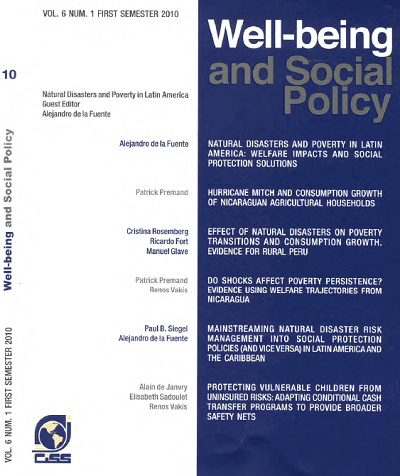
|
|
|
|

|
|
Provisional and welfare inclusion in Brazil (1988-2005): scope and limits
This paper analyses the influence of new rights derived from the Social Security System in Brazil after the Federal Constitution (1988). At least, three different and independent forces determinate the arrangements in social security policies: 1) the new social rights created by constitutional rules in response to social pressure; 2) the decrease of employment and wages in salaried jobs imposed...
|
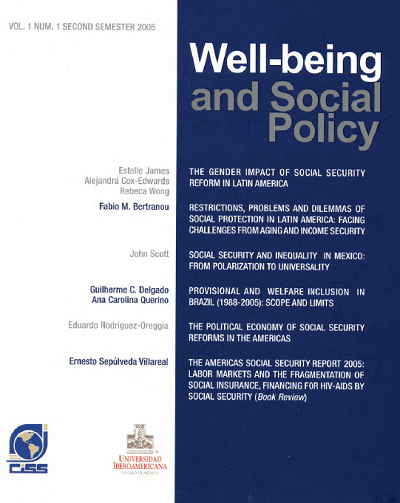
|
|
|
|

|
|
The political economy of social security reforms in the Americas
This paper analyses the factors affecting the decision to apply a reform (parametric and structural) in the Americas, which may hold a specific set of conditions, i.e. a sui generis political system and a high degree of economic openness, among others. Economic freedom is relevant in the case of structural reforms, while results for the share of older population are not conclusive. It may be that...
|
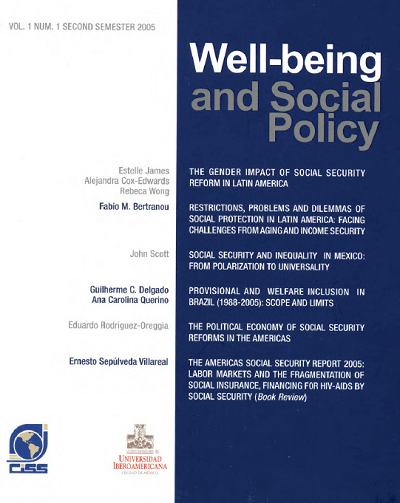
|
|
|
|

|
|
The Americas Social Security Report 2005: labor markets and the fragmentation of social insurance, financing for HIV-AIDS by social security (Book review)
The Americas Social Security Report 2005, published by the CISS, gathers the contributions, opinions, and comments of more than 30 social security specialists from different countries in the American continent, as well as the review of the most recent literature on this matter. The purpose is to present, to specialized public and to laymen, a detailed, analytic, and updated report of the...
|
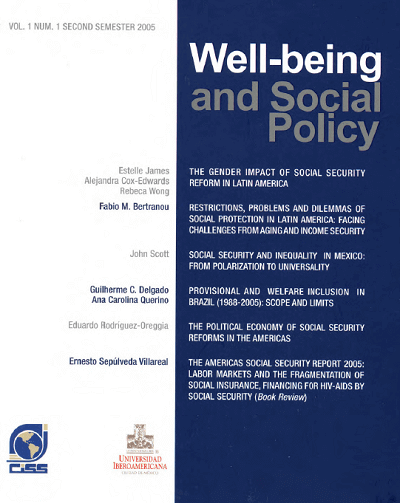
|
|
|
|

|
|
Incomplete health reforms in Latin America: some findings on their political economy
This paper raises the point that only few health reforms implemented in Latin American countries modified the existing health systems in order to fix the problems brought by the institutional fragmentation typical of this sector. A great part of these reforms did not implemented the necessary measures to improve coordination among health systems in the prevailing pluralistic model and besides,...
|
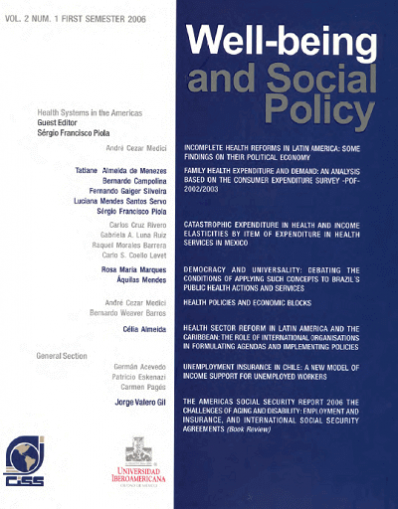
|
|
|
|

|
|
Family health expanditure and demand: an analysis based on the consumer expenditure survey - POF - 2002/2003
This paper aims at analyzing healthcare expenditure and demand of families, by estimating income-elasticity and price-elasticity for ten groups of products using the so-called model Linear Almost Ideal Demand System (LAIDS). The 2002/03 consumer expenditure surveys (POF) of the Fundação Instituto Brasileiro de Geografia e Estatística – FIBGE (Brazilian census bureau) are used, providing extremely...
|
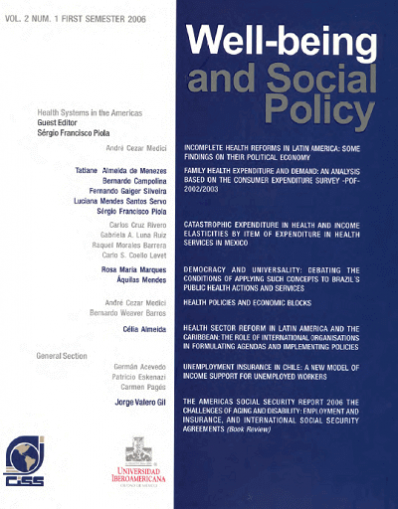
|
|
|
|

|
|
Public spaces in Mexico as social cohesion promoters: an structural modeling perspective
This research assessed the effects of several contextual factors (e.g, neighborhood insecurity, evaluation of public spaces, infrastructure, low risk behaviors) on social cohesion and residential satisfaction, in the context of low and medium-low socio economic status of individuals nearby renovated public spaces (parks and recreational facilities) in Mexico. The research method is based on...
|
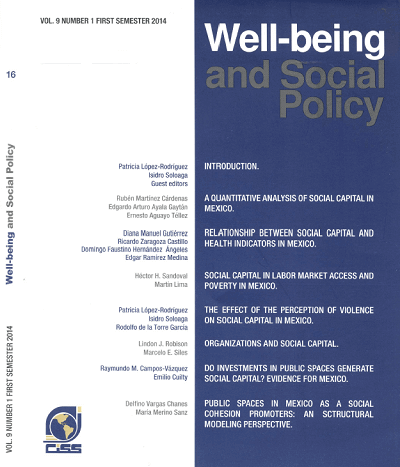
|
|
|
|

|
|
Restrictions, problems and dilemmas of social provision in Latin America: facing challenges from aging and income inequality
This paper discusses the main restrictions, problems and dilemmas that social provision faces in Latin America in a context of demographic changes and low achievements in the economic performance, particularly in the labor market. It is proposed the need to adapt the general social provision matrix as function of priorities and restrictions set by financing access. Due to the limited labor...
|
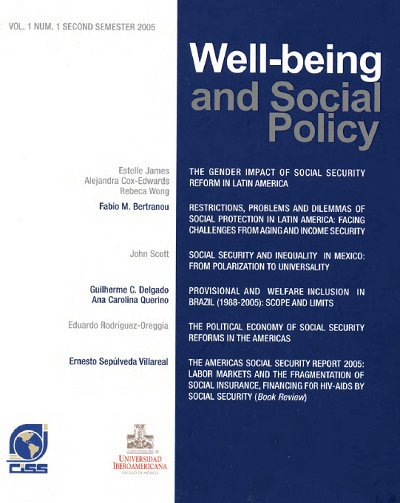
|
|
|
|

|
|
Do shocks affect poverty persistance? Evidence using welfare trajectories from Nicaragua
Shocks are often primarily associated with downward mobility or short-term movements in and out of poverty. However, households at the bottom of the welfare distribution are likely to face the most constraints to access insurance mechanisms. In this paper, we consider whether shocks directly affect poverty persistence. In order to analyze the impact of shocks on households’ welfare path over time...
|
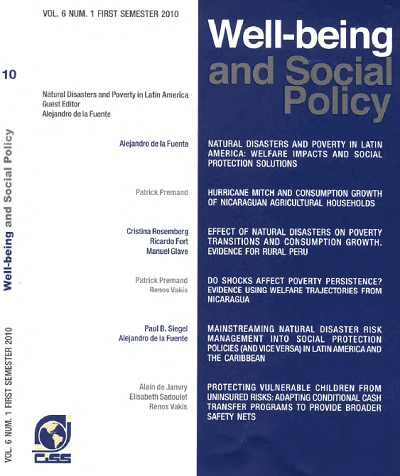
|
|
|
|

|
|
Toward closing the evaluation gap: lessons from three recent impact evaluations of social programs in Latin America and the Caribbean
Despite recent growing demand from funders and governments, rigorous impact evaluations in Latin America and the Caribbean remain the exception rather than the rule. Many commissioned impact evaluations are methodologically weak, and thus only marginally useful in assessing the impact of social interventions. Other impact evaluations feature strong research methodologies at their conception, but...
|
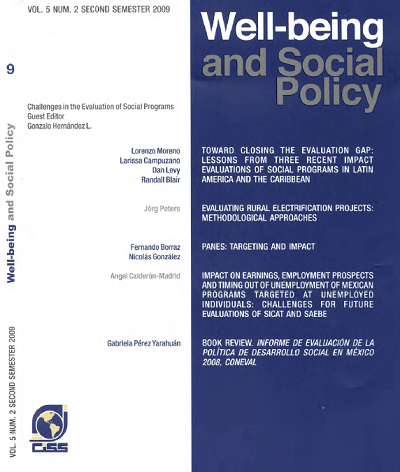
|
|
|
|

|
|
Effect of natural disasters on poverty transitions and consumption growth. Evidence for rural Peru
Natural hazards, an increasingly important phenomenon, have a direct impact at regional and household level. The growing incidence and persistence of natural events are strongly linked to increasing vulnerability of households and communities in developing countries. Previous socioeconomic vulnerabilities may exacerbate the impact of a specific event, making more difficult the process of...
|
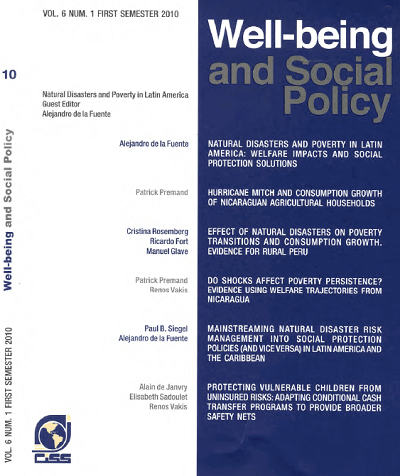
|
|
|
|
|